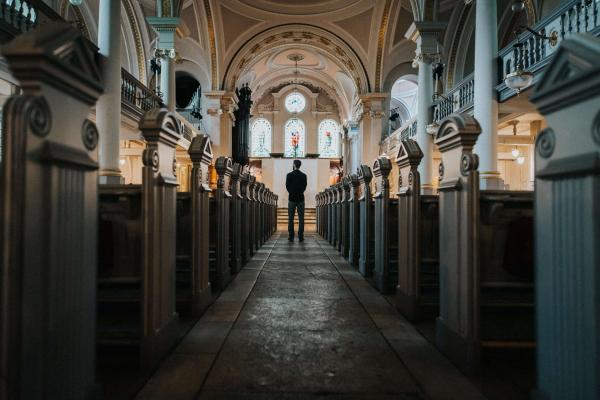If UNC Chapel Hill will permit me, I’ll put it this way: Southern Baptist born, Southern Baptist bred, and Southern Baptist dead. I grew up in a Southern Baptist Convention (SBC) church, was educated in an SBC seminary, was ordained at an SBC church, teach part-time for SBC schools, serve at an SBC church, and last year I resigned from my full-time teaching position at an SBC school. I love the SBC, and while I’m not an “insider,” I consider myself loyal to this denomination.
However, there is a significant problem imbedded with Southern Baptists’ DNA. Our convention was founded because we wanted to own other human beings as property. To put it another way, a group of white Baptists from the south wanted to continue to exercise their power over other human beings — without the criticism of Baptist abolitionists — to the extent that they split from northern Baptists who were willing to maintain fellowship with them. Most people know this, but I had no clue until I was in college, and it shocked me. That’s our original sin.
Perhaps unrelated — but also perhaps related — our convention was re-established roughly one hundred years later as thoroughly conservative, hell-bent on defending the Bible’s inerrancy, through what’s known as the Conservative Resurgence. This “resurgence” was clearly aimed — and succeeded — at returning the Southern Baptist Convention to its conservative theological roots. This time, though, powerful Southern Baptists expelled those who would criticize them rather than creating a new denomination.
I grew up hearing war stories of the Resurgence, with starring roles given to folks like Paige Patterson, Paul Pressler, and Adrian Rogers. I idolized these men. They stood for what is right, and against all odds they defeated what they saw as the evils of encroaching liberalism. I later read about the various tactics they used, political maneuverings that specifically targeted key positions within the SBC denomination system that would solidify conservative power. And while I remain grateful for conservative theology in the SBC, I now wonder if the efforts to swing the SBC theologically to the right had the consequence — unintended or otherwise — of resurfacing our DNA: asserting power for our own gain over other humans made in God’s image.
Genesis tells us that God created the first two human beings in God’s own image. That is, God created them to represent God’s rule and reign on earth, to care for the good and also to emulate God in creating good things. Christians will argue over whether this creation included a male-female hierarchy, but every side in the argument should agree that either Adam or Eve asserting power, or dominance, over the other was not part of the creator’s intent. Rather, they were to work together as shepherds of this good earth. The same antagonism toward lording power over others is displayed in Jesus’s statement upending the power structure of his culture (and ours):
You know that the rulers of the Gentiles lord it over them, and their great ones exercise authority over them. It shall not be so among you. But whoever would be great among you must be your servant, and whoever would be first among you must be your slave, even as the Son of Man came not to be served but to serve, and to give his life as a ransom for many (Matthew 20:25–28).
Now, 40 or so years on from the Conservative Resurgence, we know that the men revered for their work are also guilty of using their power to protect sexual predators. Paige Patterson shielded Darrel Gilyard. Many men have accused Paul Pressler of sexual misconduct. We’ve heard the stories of Anne Marie Miller, Susan Codone, Megan Lively, Tiffany Thigpen, Jules Woodson, Jennifer Lyell. And these stories are ugly. It’s not just the abuse, though that is horrific; it’s the cover up of that abuse — the wielding of power to protect the people in power and the reputation of an institution.
Is it possible that our DNA has reared its head again? Is it possible that the very issue that gave the SBC its start — exercising power over humans by enslaving them — found its way into the Conservative Resurgence, only this time the power was exercised in the name of proper theology? And is it possible that the men who wielded power in the Conservative Resurgence got drunk — and the rest of us along with them — on that power? So drunk, in fact, that they — and by extension we — trampled underfoot women and children who were being sexually abused, further adding to the trauma by vilifying, ignoring, and refusing to believe them because, if they were being honest, then the whole power structure would come tumbling down? It’s not just possible, it’s built into the SBC’s DNA, there since its founding, and now being exposed again.
Let me reiterate: I have the right degrees from the right institution and I hold the right theological positions. I’m an inerrantist, I hold to the Baptist Faith and Message 2000, and I am gravely concerned that our history of political maneuvering has cloaked a love for power in the language of right theology.
When I protested women being compared to “crack houses” in a chapel at my SBC college, school administrators told me I was making a mountain out of a molehill, that I was taking on powerful people, and that I was bringing division to the institution and sullying its reputation. They even asked me if I’d ever heard of Haman’s gallows, the device used to kill Haman in the book of Esther, the implication being that I was crafting a device that would be used to kill me (figuratively, they assured me). Yes, I have heard of it, and yes, powerful people in the SBC have destroyed many, many women, men, and children. Power, it turns out, has mattered more than recognizing the image of God in all humans. It’s time to change that.
Got something to say about what you're reading? We value your feedback!







